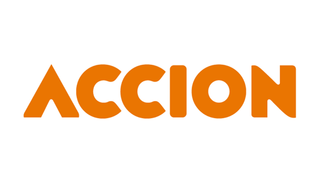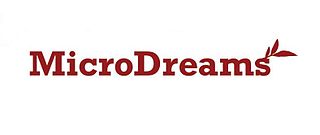
Microfinance is a category of financial services targeting individuals and small businesses who lack access to conventional banking and related services. Microfinance includes microcredit, the provision of small loans to poor clients; savings and checking accounts; microinsurance; and payment systems, among other services. Microfinance services are designed to reach excluded customers, usually poorer population segments, possibly socially marginalized, or geographically more isolated, and to help them become self-sufficient.

Accion is an international nonprofit. Founded as a community development initiative serving the poor in Venezuela, Accion is known as a pioneer in the fields of microfinance and fintech impact investing.
HSBC Bank Australia Limited is the Australian subsidiary of HSBC. The bank offers a wide range of financial services in Australia through a network of 36 branches and offices. These services include retail and commercial banking, financial planning, trade finance, treasury and financial markets, payments and cash management and securities custody.

First City Monument Bank (FCMB), a member of FCMB Group Plc, is a financial services holding company headquartered in Lagos. FCMB Group Plc has nine subsidiaries divided among three business groups: commercial and retail banking, investment banking, and asset and wealth management. As of December 2020, the Group's total assets were valued at US $5 billion.

Norfund is a development finance institution established by the Norwegian Storting (parliament) in 1997 and owned by the Norwegian Ministry of Foreign Affairs. The fund receives its investment capital from the state budget. Its head office is located in Oslo with local offices in Thailand, Costa Rica, Kenya, South Africa and Ghana.
Before Uganda's independence in 1962, the main banks in Uganda were Barclays ; Grindlays, Standard Bank and the Bank of Baroda from India. The currency was issued by the East African Currency Board, a London-based body. In 1966, the Bank of Uganda (BoU), which controlled the issue of currency and managed foreign exchange reserves, became the central bank and national banking regulator. The government-owned Uganda Commercial Bank and the Uganda Development Bank were launched in the 1960s. The Uganda Development bank was a state-owned development finance institution, which channeled loans from international sources into Ugandan enterprises and administered most of the development loans made to Uganda.

Bank of Ayudhya Public Company Limited, branded and commonly referred to as Krungsri, is the fifth largest bank in Thailand in terms of assets, loans, and deposits. Through its branches and service outlets in Thailand and abroad, the company provides banking, consumer finance, investment, asset management, and other financial products and services to small and medium enterprises, large corporations and individual customers.
Wizzit is a provider of basic banking services for the unbanked and underbanked in South Africa. Its services are based on the use of mobile phones for accessing bank accounts and conducting transactions, in addition to a Maestro debit card that is issued to all customers upon registration. Wizzit is a branchless banking business, meaning that its services are designed so that customers can generally conduct transactions without the need to visit bank branches.

Oikocredit is a cooperative society that offers loans or investment capital for microfinance institutions, cooperatives and small and medium-sized enterprises in developing countries. It is one of the world's largest private financiers of the microfinance sector. The idea for Oikocredit came from a 1968 meeting of the World Council of Churches. Following this, Oikocredit was established in 1975 in the Netherlands.
Opportunity Bank Uganda Limited (OBUL), is a commercial bank in Uganda. It received a commercial banking licence from the Bank of Uganda on 25 September 2019.

Microfinance Information Exchange, Inc. was a non-profit organization that provided market data and intelligence on financial service providers catering to low-income populations around the world. Founded by the Consultative Group to Assist the Poor (CGAP) and sponsored by the Citi Foundation, CGAP, the Mastercard Foundation, MetLife Foundation, Bill & Melinda Gates Foundation and others, MIX had offices in Washington DC, New York, Lima (Peru), Baku (Azerbaijan), Dakar (Senegal), and Hyderabad (India). MIX's mission was to provide data analytics to empower decision-makers - socially responsible investors, policy makers and financial services providers - to build an inclusive financial services ecosystem. Since its founding in 2002, MIX had built the digital information infrastructure needed to bring greater transparency to financial sectors serving low-income populations in emerging markets, including providing market data on over 3,000 financial services providers (FSPs). In 2016, MIX shifted its strategy to help improve the information flow in other segments of financial inclusion, like smallholder agricultural finance, fintech, digital financial services (DFS) and green energy finance. In May 2020, MIX became a unit of the Center for Financial Inclusion, a thinktank housed at Accion.
Energy in Common (EIC) was a not-for-profit organization issuing microloans specifically and only for renewable energy technologies. EIC was founded by Hugh Whalan and Scott Tudman in 2009. It has the very ambitious goal of delivering renewable energy to 15 million people in the next five years, while fighting poverty by empowering developing world entrepreneurs through microloans. EIC represents one of the most promising contenders in the growing green microfinance sector. As of 2012, it has ceased operations due to a lack of funds after their overseas partners defaulted on their loan obligations.

The MicroDreams Foundation is a U.S. 501(c)(3) non-profit organization founded by Gregory Casagrande in 2002 as a microfinance accelerator that helps small, growing micro-enterprise development organizations reach financial self-sufficiency. Over the past nine years, MicroDreams has provided substantial support to the SPBD microfinance network in all four of its branches in and has helped to scale up other young emerging partner microfinance institutions (MFIs) in Bolivia, Ecuador, and Peru. MicroDreams uses loans, loan guarantees, and technical assistance to help provide meaningful economic opportunity to the poorest members of society.
Lendwithcare is a microfinance lending website from the development charity CARE International UK. Launched in September 2010, it allows individuals and groups to make small loans to entrepreneurs in developing countries, and help them work their way out of poverty. It supports entrepreneurs in Cambodia, Togo, Benin, the Philippines, Bosnia and Herzegovina, Vietnam and Ecuador through partner microfinance institutions (MFIs). It does not charge any interest on the loans made to entrepreneurs by supporters - the MFIs do.
Angkor Mikroheranhvatho (Kampuchea) Co., also known as AMK, is a registered microfinance institution (MFI) headquartered in Phnom Penh, Cambodia with over 280,000 active borrowers. AMK is the largest provider of credit in Cambodia in terms of borrower numbers and has branches in 23 provinces and Phnom Penh city. It has over 10,000 active savers and over 1,000 employees. AMK provides several microfinance services, including microcredit, microsavings, and mobile money transfers.
Bandhan Bank Ltd. is a banking and financial services company, headquartered in Kolkata. Bandhan Bank is present in 34 out of 36 states and union territories of India, with 5,639 banking outlets and more than 2.63 crore customers. Having received the universal banking licence from the Reserve Bank of India, Bandhan Bank started operations on August 23, 2015, with 501 branches, 50 ATMs and 2,022 Banking Units (BUs). The Bank has mobilised deposits of over ₹96,331 crore and its total advances stand at over ₹99,338 crore as of March 31, 2022.
responsAbility Investments AG is a private Swiss enterprise, founded in 2003 and headquartered in Zurich. Its core business are investments in microfinance companies which provide credit and other banking services to very small, small and medium-sized enterprises who have previously had limited access to formal financial services in frontier or developing countries. Socially responsible business that seeks to be both transparent and profitable on a sustainable basis is financed. Impact investing is a general term used for such endeavors. In addition, investments are made in specific agriculture and energy companies in frontier or developing countries. responsAbility Investments is registered with the Swiss Financial Market Supervisory Authority (FINMA).
Microfinance in Kenya consists of microfinance facilities and regulations in Kenya which has been developing since the mid 1990s. Legislation was passed in 2006 with the Micro Finance Act which became active in 2008. By 2010 there were more than twenty large micro finance institutions in Kenya, which provided US $1.5 billion to approximately 1.5 million active borrowers. With over 100,000 clients, Equity Bank Kenya had the largest share of business loans representing market share of 73.50% followed by Kenya Women Microfinance Bank with 12.06%. Most microfinance firms as in other countries have eligibility criteria which may include gender, age, a valid Kenyan ID, a business, an ability to repay the loan and be a customer of the institution.

Yetu Microfinance Bank Plc. (YETU) is a microfinance bank in Tanzania. It is the first microfinance institution to be listed in the Dar es Salaam Stock Exchange. Yetu is a Swahili word meaning Ours.
Satin Creditcare Network Limited is a non-banking finance company (NBFC), licensed by the Reserve Bank of India. It was founded in 1990 by Mr. H P Singh. The company's offers financial requirements for excluded households at the bottom of the pyramid. Satin Creditcare Network Limited is a micro-finance institution (MFI) in the country with presence in 7 states and more than 12,00 villages.










